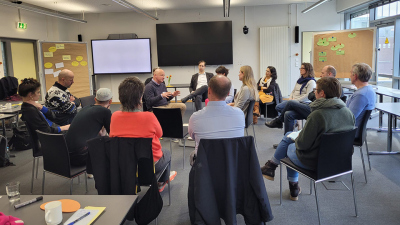- Home
- Discover
- Media Releases
- Citizen Jury
Citizens discuss CCS with experts at MARUM
The Citizens' Jury is a small group of 12 to 15 people with as little or no previous experience of CCS (carbon capture and storage) as possible and ideally represents a cross-section of the population. This includes age and gender, employment status, and migration background. After a brief round of introductions, the jury was presented with two different CCS methods in a specialist presentation, which were analyzed as part of the moderated discussion.
The focus was on the use of basaltic ocean crust in the North Atlantic, which is being investigated as part of the aims³ collaboration coordinated at MARUM (under the roof of CDRmare) to demonstrate the effectiveness of the underlying reactions. In contrast to classical CO2 injection into former oil and gas reservoirs, aims³ uses the permeable upper ocean crust to separate limestone from CO2 in injected waters. This would render the greenhouse gas harmless to the climate for millions of years. The jury discussed the innovative research project in the Atlantic Ocean against the background of transparency regarding environmental impacts, feasibility, potential costs, and geopolitical implications.
Summary of the Citizen Jury results:
- Participants developed a comprehensive citizen statement highlighting various aspects. Particular attention was paid to transparency and communication, as well as the geopolitical impact and the need for a clear financial distinction between public and industrial funding.
- The question of responsibility and oversight in CO2 sequestration was also a focus, as were concerns about potential impacts on CO2 reduction efforts in other areas. The participants called for a transparent comparison of CCS with other reduction methods to achieve the German government's climate targets.
In the final discussion, the participants emphasized the importance of different perspectives and considered the Citizen Jury to be an effective democratic instrument. The urgency of the technology and the importance of increased cooperation in communication were emphasized.
The Citizen Jury at MARUM shows how direct participation of the population can lead to well-founded decisions. The knowledge gained will help to promote the acceptance of CO2 storage methods and at the same time bring the concerns of citizens into the political discussion.
More information:
Contact:
Dr. Nike Fuchs
MARUM – Centre for Marine Environmental Sciences at the University of Bremen
CDRmare/ AIMS³
Email: [Bitte aktivieren Sie Javascript]
In the research mission “Marine carbon sinks in decarbonisation pathways”– in short: CDRmare – of the German Marine Research Alliance (DAM), about 200 scientists in six collaborative research consortia are investigating, how and to what extent the ocean can play a sustainable role in the removal and storage of carbon dioxide from the atmosphere. The long-term goal is to develop a roadmap for the active use of marine carbon sinks in order to contribute to the mitigation of the impacts of anthropogenic climate change and to help achieve the Paris climate goals. CDRmare (CDR = Carbon Dioxide Removal) is coordinated at the GEOMAR Helmholtz Centre for Ocean Research Kiel and the Leibniz Institute for Baltic Sea Research Warnemünde. Germany's Federal Ministry of Education and Research is funding the research mission with 26 million euros over an initial phase of three years (1.8.2021 - 31.7.2024).
The German Marine Research Alliance and its 22 member institutions develop solutions-oriented knowledge and potential courses of action for the sustainable use of coasts, seas and oceans.



